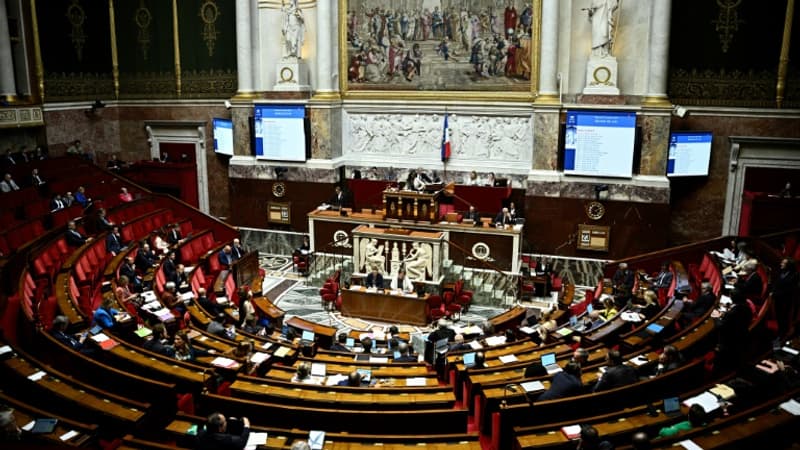49.3 for the moment, without a solemn vote on Tuesday: after six days of heated exchanges on the revenue part of the 2025 budget, deputies interrupted their debates on the afternoon of Saturday, October 26 without having finished their examination, and should resume it on November 5.
When the session closed at midnight on Saturday, more than 1,500 amendments remained to be considered on this first part of the text, which in principle should have been subject to a final vote on Tuesday.
Next week, the deputies will mobilize on the “Secu” budget; and according to several parliamentary sources, the debates on the “PLF” will resume on Tuesday the 5th.
The calendar will be discussed on Tuesday morning at the conference of presidents, “with the Government”, and “we will be able to see how all this can be foreseen”, said the president of the Assembly, Yaël Braun-Pivet, from the podium. .
Series of setbacks for the government
In six days, deputies “adopted nearly 40 billion euros of additional taxes” in addition to the “30 billion euros of the government’s initial copy,” lamented Macronist deputy Charles Sitzenstuhl. “It really is time for all this to end,” he added, criticizing “fiscal madness.”
“The government coalition is sinking” and “there are not even ships for those who remain (…), I am very sorry for our country,” launched the leader of the RN in this budget battle, Jean-Philippe Tanguy.
On Saturday, like the previous days, the government suffered a series of setbacks. The left thus adopted an exceptional 10% tax on dividends distributed by CAC40 companies. The deputies granted real estate loans at zero interest rates throughout the territory, both for new properties (as proposed by the government) and for old properties.
End of the “penalty” for gasoline and diesel cars
They also made permanent the exceptional contribution requested from maritime transport companies, limited the tax niche from which this sector benefits by 500 million euros, approved a gradual reestablishment of the CVAE (Contribution on the added value of companies) and eliminated the increase provided. in the “penalty” for gasoline and diesel cars.
All according to sometimes changing alliances: if the New Popular Front alone obtained the progressive reestablishment of the CVAE, it was a heterogeneous alliance of elected RN, LR, socialists and communists that got the best of the automobile sanction.
And the RN, accused by the Macronist camp of having an erratic political line on corporate taxes, mixed its voices with the left to limit the tax niche for shipowners, in the face of the still very scarce ranks of the “base” forces. common”. intended to support the government.
Voted amendments on VAT and furnished accommodation
Other modifications adopted are a series of VAT reductions for different sectors: food aid associations, passenger transport repair companies – except air -, new social housing or the “first kilowatts” of gas and electricity consumed by homes.
The amendments introduced by Renaissance and the PS reduced tax relief on furnished tourist accommodation to 30%, thus including in the budget a provision aimed at better regulating the “Airbnb” accommodation market.
Already on Friday, the Government had suffered numerous defeats in this “revenue” part of the budget, with the elimination of the temporary surcharge on large companies (whose rates the left had previously increased) or the elimination of the surcharge on electricity, fought for by its own troops.
Does a 49.3 come?
Opposition MPs suspect that the government is pushing for 49.3 by allowing a deep review of Michel Barnier’s draft budget.
Unfounded suspicion, government spokesperson Maud Bregeon assured Le Parisien: “We do not give in to the ease of 49.3, (…) the moment of debate is a moment of great clarification that also allows us to build a compromise,” she stated. .
Other elected officials wonder if the Government is not rather seeking a rejection of the text, as in the Finance Commission, or a stagnation of debates that would prevent a vote before the deadline of November 21, linked to constitutional deadlines. In both cases, the consequence would be a direct transmission of the text to the Senate.
Source: BFM TV


